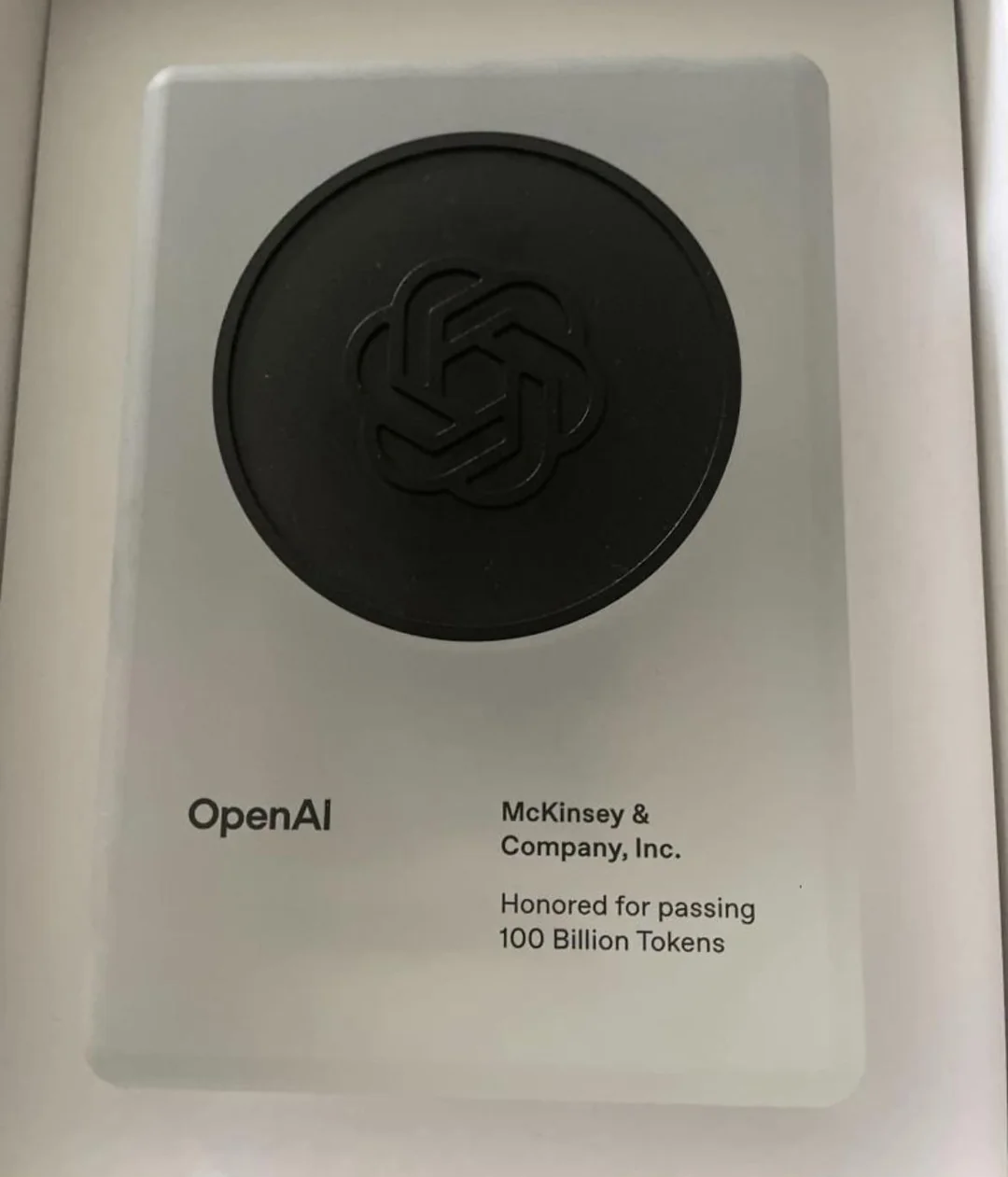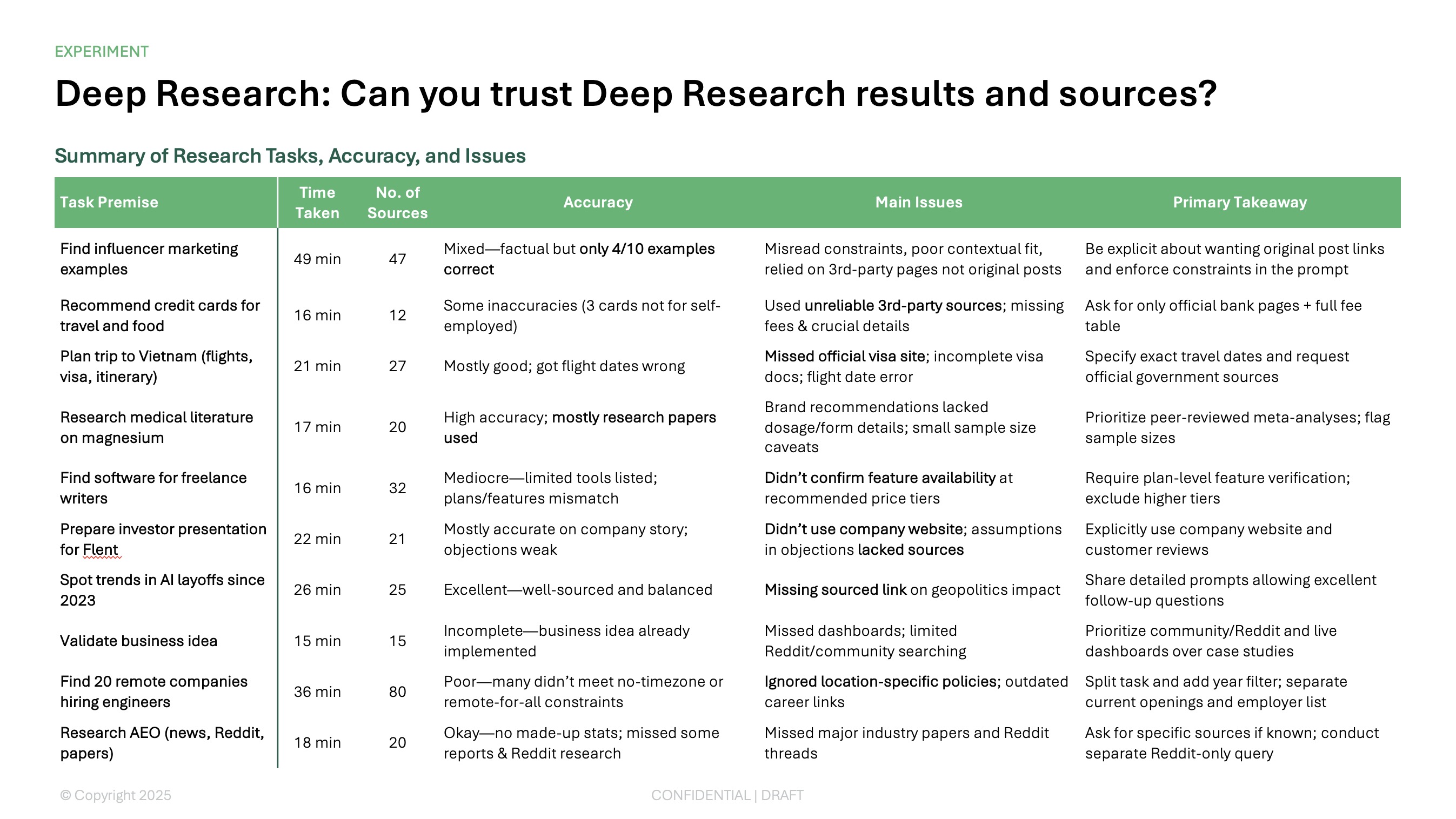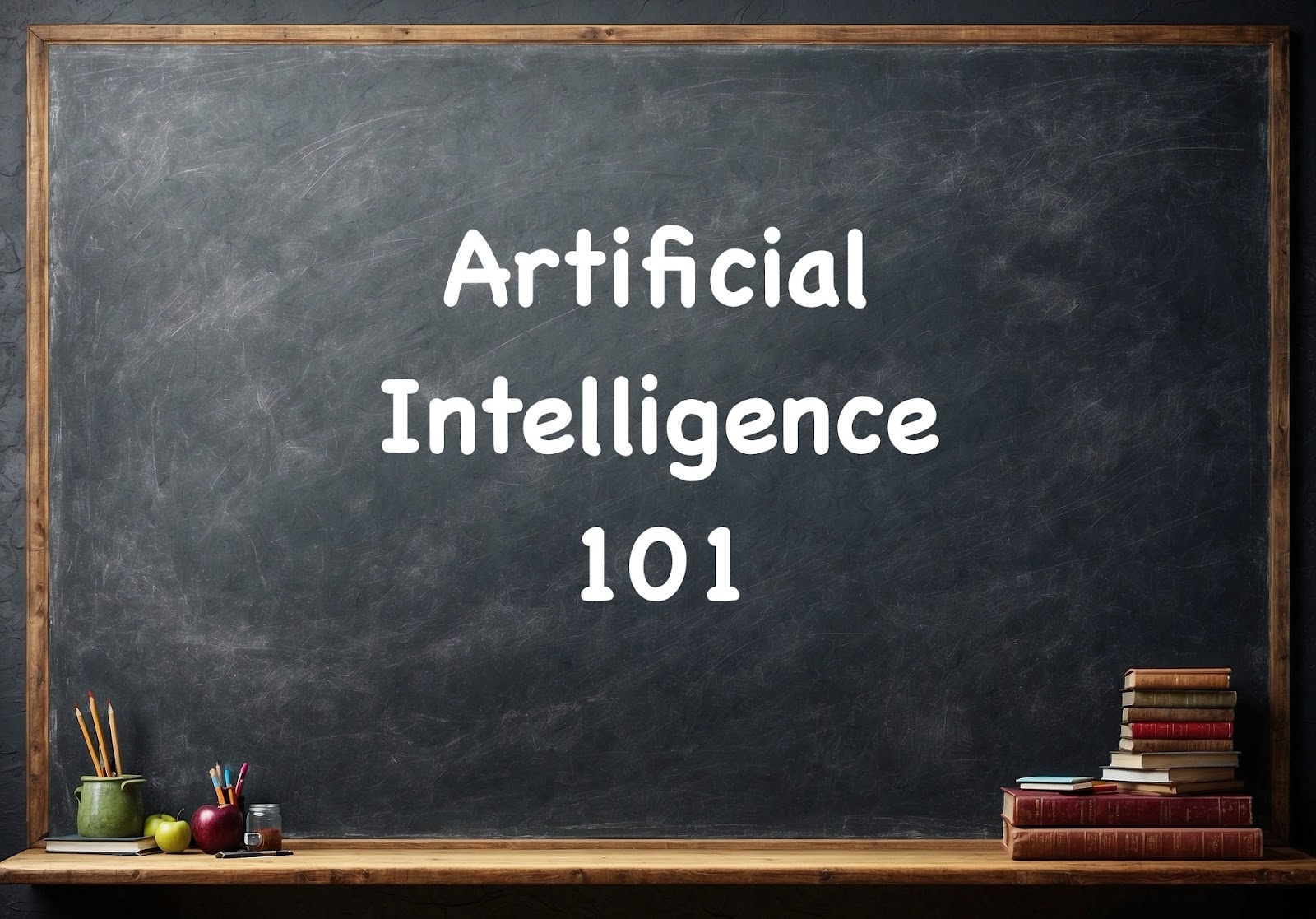Consulting firms have been pioneers in using generative AI to streamline their workload. While other large industries are catching up, consulting firms—both large and small—had already begun investing heavily in AI tools and developing new products that incorporate AI solutions.
In this article, I’ll share the current status of how the top consulting firms are using AI.
Instead of paying millions of dollars for an AI strategy, you can learn from what they're doing to identify areas where you can automate/outsource more of your tasks to artificial intelligence.
{toc}
TL;DR: A summary of how the top consulting firms are using AI
Here’s a quick table summarizing how the big consulting firms are using AI:
*Despite building Lilli internally, McKinsey also boasts partnerships with the major AI players including Microsoft, Google, and Anthropic. However, McKinsey doesn’t say if it used these collaborations to build Lilli anywhere publicly.
Everyone’s built (or bought) their own AI chatbot
Lilli is McKinsey’s generative AI solution. It’s a chatbot trained on their intellectual property, encompassing 100,000 documents and interviews. This AI tool can do a host of things. Here are a few:
- Find research documents
- Identify the right experts in the org
- Pinpoint weaknesses in an argument and anticipate questions
While Lilli is trained on McKinsey’s internal database, and employees also have the option to use external sources for research when required. Lilli has been around since 2023—consulting firms were one of the first to harness generative AI’s potential—and a staggering 94% of McKinsey’s workforce have already used the platform. 74% of employees use it regularly. It has answered over 19 million prompts.
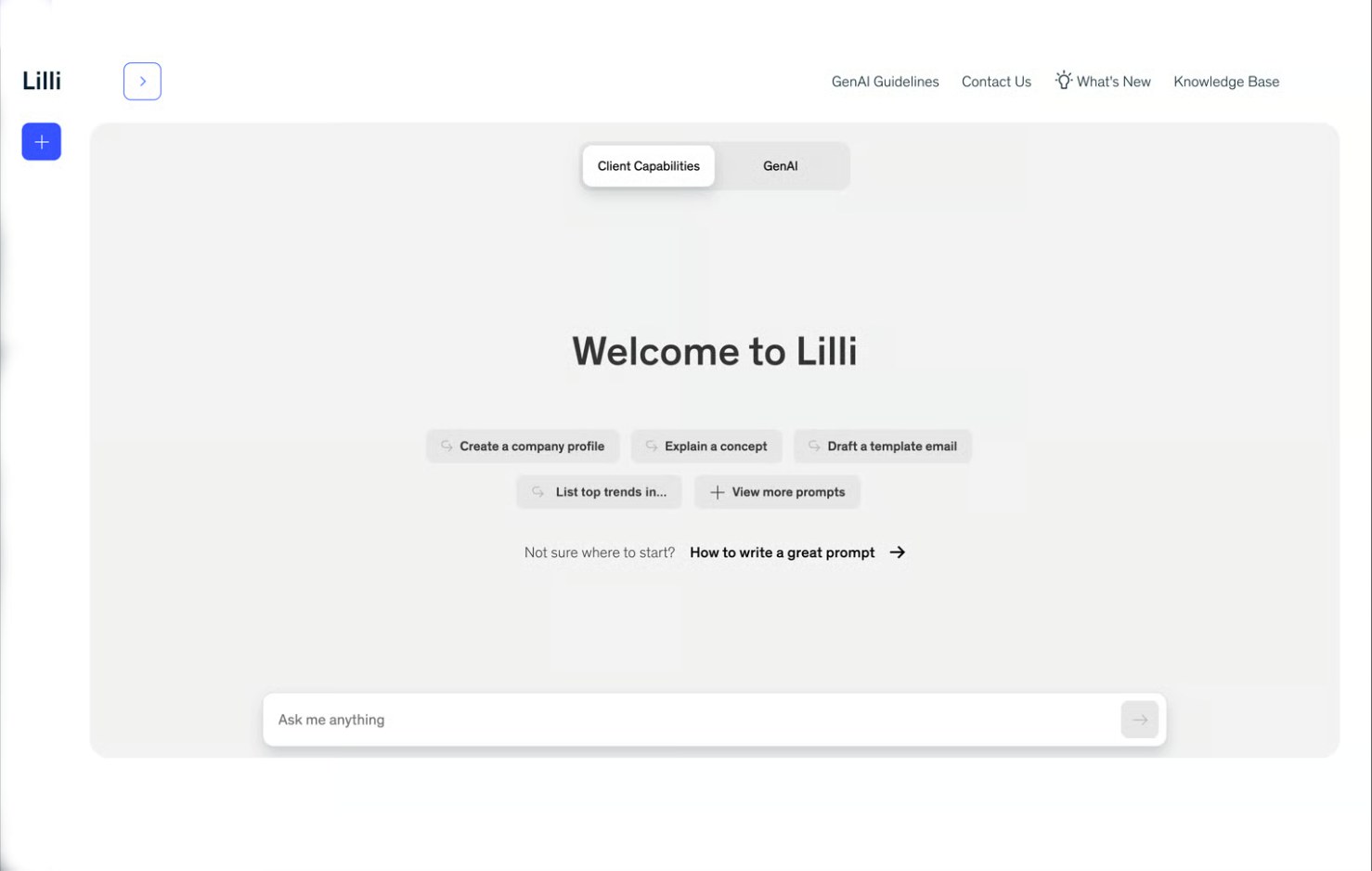
According to McKinsey, this translates to 30% of time saved that would’ve been spent on information gathering and analysis. They’ve also seen a 20% improvement in content quality and accuracy.
Deloitte isn’t far behind. It also came up with its own AI virtual helper—called PairD (pronounced “paired”)—in late 2023. You can use PairD to draft emails, write code, create presentations, write meeting agendas, etc. PairD’s usage has surged from 25% to nearly 75% over the past year among the UK audit staff.
Since Deloitte doesn’t allow its employees to use ChatGPT, it also launched Zora AI—a fleet of AI agents to fulfill GPT’s absence—in partnership with NVIDIA. Employees are using it to:
- Source and analyze data
- Run mathematical models to find trends
- Translate insights into something more actionable
- Collaborate with other agents to run complex workflows
Boston Consulting Group (BCG) followed suit and launched GENE, its proprietary AI chatbot. Like McKinsey, BCG has fed GENE with internal knowledge. It’s built on GPT-4o and customized to the org’s needs (BCG has partnered with OpenAI). Use cases are similar to consultants in other firms. Employees use GENE for analyzing interviews, synthesizing data, and doing the tedious, manual tasks.
BCG also launched its own AI presentation tool and equipped its consultants to create several GPT agents, customized to their specific use cases. To date, BCG employees have built over 6,000 AI agents.
Similar to BCG, Bain & Company also created its AI chatbot, called Sage, originally built on GPT-4o. Their employees have also built over 19,000 custom GPTs—not surprising, given Bain’s strong partnership with OpenAI.
Coming to KPMG, they took a slightly different route and formed an alliance with Google Cloud to create Agentspace—which is similar to a family of AI agents trained on company data. The goal is to automate administrative tasks, allowing employees to spend more time with clients. They also have Clara AI (in partnership with Microsoft Azure) for auditors.
PwC practiced something similar and created ChatPwC in partnership with Microsoft.
Ernst & Young invested $1.4 billion to create their own conversational assistant, EY.ai in 2023. In 2025, the company collaborated with NVIDIA to expand the product.
It makes sense from a security standpoint for firms to launch their own AI platforms or partner with reputable names like Microsoft or Google. The vast datasets of consulting firms are another reason to create internal AI agents or platforms—you can train them on the firm’s knowledge.
For most firms, AI also began as an internal initiative before being rolled out to clients. The aim is to increase productivity while simultaneously building a sandbox for learning (so there’s no mistake when employees use AI for clients).
A study by Harvard Business Review and BCG found consultants using AI completed 12.2% more tasks on average and completed those jobs 25.1% more quickly. The sample set was small, though (only 758 consultants participated in the survey), and there have been other reports contradicting this positive result.
BCG, for instance, found 74% of companies struggle to achieve and scale the value of AI initiatives. Deloitte, too, was asked to issue a partial refund for a $290,000 report prepared for the Australian government that contained AI-generated hallucinations.
The big consulting firms aren’t oblivious to this—which leads me to the next section.
Consulting firms are running massive AI literacy campaigns
The launch of numerous proprietary AI platforms and partnerships with AI companies is followed by efforts to help employees upskill using AI.
Bain & Company has run several events like ChatGPT Olympics and a 1-hour AI challenge to provide employees with opportunities to learn about various AI use cases in an interactive environment.
McKinsey also noted that its employees faced what it calls “prompt anxiety” to use Lilli. One hour of prompt training soothed the worry and increased adoption. The firm continues to invest in training its employees to use AI better.
Deloitte has its own AI academy to teach its employees the fundamentals of using AI. They’ve even partnered with Scope to provide free access and training for PairD.
BCG has its own AI training program and a dedicated team for L&D of its AI tools. It even has what the company calls “ground troops”— a network of 1,200 employees focused on gathering day-to-day AI related feedback, providing hands-on training, and pushing adoption.
PwC has plans to invest $1 billion in AI (over three years, starting 2023) and train its 75,000 employees on how to use AI tools to be more productive. 60% of workers had already begun their training in 2023. PwC also has 1,500 employees similar to BCG’s ground troops—workers dedicated to encouraging employees to use AI more and more. Since its inception, PwC has had over 500 prompting parties (10/week) and is looking forward to 800 more.
EY has awarded over 100,000 AI-related credentials since 2018 and also launched EY Tech MBA in partnership with Hult International Business School. Their focus has been on teaching its consultants responsible AI use in addition to the functional aspects.
These learning initiatives are much needed. A research by BCG found just 14% of frontline workers received AI-related training to adapt to their jobs with the new tool. 86% say they’ll need it.
Most consulting firms have also been honest about organizational changes prompted by AI—more on that in the next section.
AI is reshaping entry-level roles in consulting firms
The most common result of AI handling administrative tasks has been a significant reduction in the number of junior employees worldwide. Consulting firms are no different.
When Lilli was launched in 2023, McKinsey cut over 5,000 jobs the same year.
Big 4 firms have also significantly dialed back on hiring new employees. KPMG has slashed hiring for entry level jobs by 29 percent, Deloitte by 18 percent, and EY by 11 percent. If you zoom out, data from job board Indeed also shows 44% fewer openings for accounting graduates (in the UK) compared to 2023. Even firms like Accenture have said they’d lay off employees who aren’t able to reskill using AI. Another resource reports Accenture has laid off 11,000 employees in an effort to implement its AI reskilling strategy.
Some experts say these layoffs aren’t unexpected and are likely not solely due to AI. Many consulting firms overhired during COVID-19 and these hiring freezes and layoffs are a market correction.
And it’s not all gloom and doom. Junior roles are few, yes, but they’re also shifting rapidly. PwC is training its accountants to function more like managers—engage in deep critical thinking while AI does the manual, tedious tasks. BCG has hired 1,000 new employees to meet demand for its AI services.
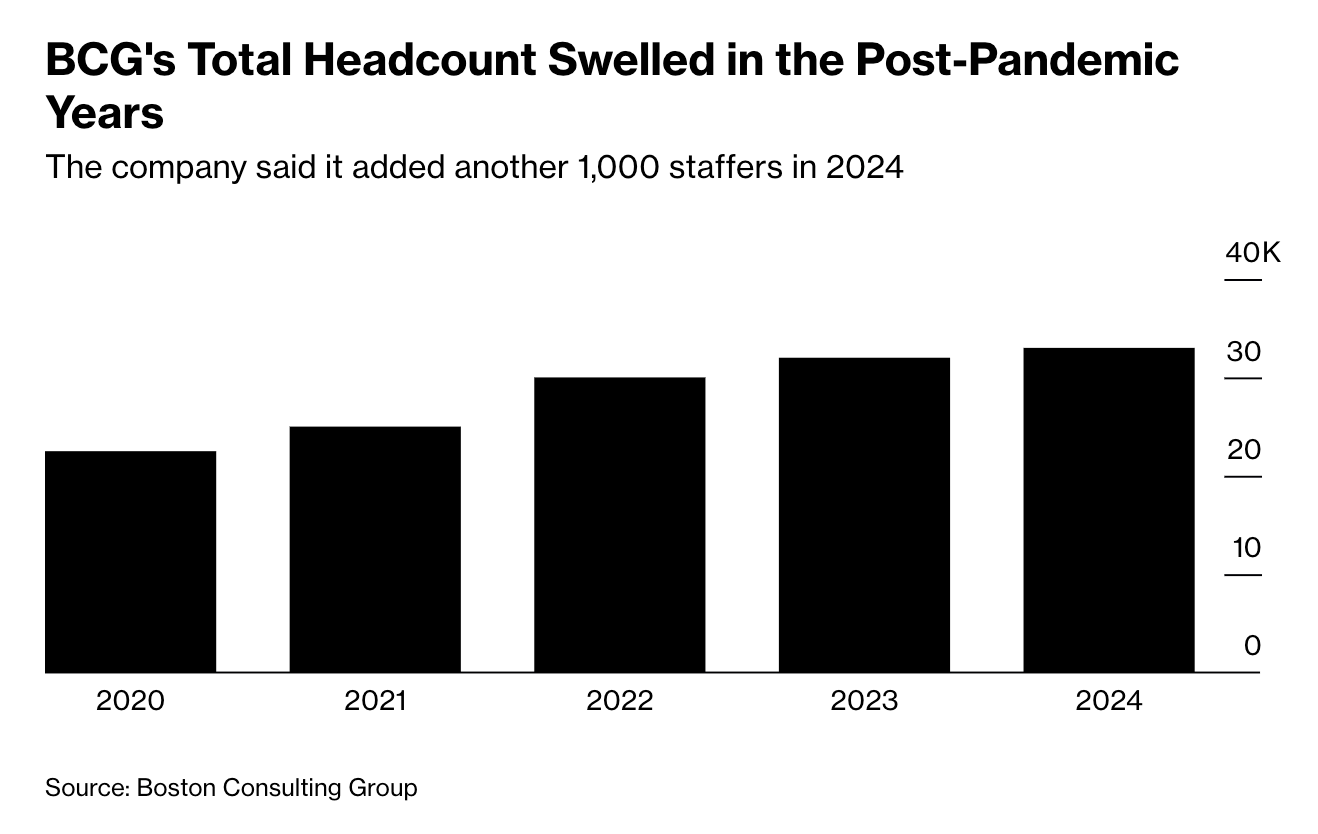
Accenture, despite the job cuts, has also hired over 77,000 AI and data professionals in 2025. And McKinsey, following the layoffs in 2023, is planning to hire 12% more staff in 2026.
The reality is consulting firms need AI expertise more than ever. A study by Bain & Company found that one in two AI jobs could remain unfilled by 2027. 44% executives point to a lack of in-house expertise slowing down AI adoption.
AI-related services are contributing more and more to the bottom line
It has been a while since consulting firms started offering AI as part of their services. For BCG, AI consulting contributed 20% of the revenue in 2024. 40% of McKinsey’s client work also includes AI. Even Accenture credited $900 million in new bookings to AI consulting services in 2024. Recently, EY also shared that its AI-related revenue was up by 30% in its 2025 financial year.
If you see the case studies of top firms like McKinsey, Bain, and BCG, you can see how they offer custom-built AI services to help their clients. For instance, McKinsey trained 8,000 service agents for Deutsche Telekom in its first round—boosting first time resolution rates by 10 percent. Similarly, BCG worked with Cathay Pacific to save them millions in disruption costs, thanks to an AI solution called Pathfinder.
The demand for AI-centric services is only going to grow. Businesses need the help of consulting firms to harness the full power of artificial intelligence and streamline operations. Companies have already begun to prefer firms with strong AI expertise.
Conclusion: There’s no place for AI skeptics in consulting firms
If the above trend has proved anything, it’s that consulting firms have been the pioneers of AI tools—for them, adapting to the new technology is not optional, it’s how they operate.
That said, AI is still used to supplement consultants in their jobs, not replace them. AI is doing the dream right now: automating the admin, manual, necessary tasks so we can focus on the important stuff requiring deep thinking. AI is a partner, not a foe.
If you’re already taking strides to make AI a part of your everyday workflow, awesome. Keep at it! If not, here are some tasks consulting firms are doing using AI that you can, too:
- Data synthesis: Firms are no longer relying on manpower to find patterns in data. They’re using their own AI agents, created with GPT or other tools, to summarize their findings.
- Write emails or code: AI possibly can’t write flawless code that never has bugs or an email that conveys your point thoughtfully and with empathy. But it can help you get over the initial hump of the blank paper. Any tool can do here—most firms use their own AI platforms or partner with well-known names like OpenAI, Microsoft, or Google.
- Meeting-related admin: Setting agendas, taking meeting notes, and all those tasks are now obsolete jobs that no one has to do (thankfully). Use an AI meeting tool that integrates with Zoom/Meet/Teams to do the job for you.
- Knowledge management and research: Most firms have created an AI platform or agent trained on the company’s data to help employees find anything they need in a blink. You can create one of your own using GPT (or an AI model of your choice), too.
- Creating presentations: Presentations can now be easily created using tools like Plus AI. All you have to do is provide a prompt or upload a file (client call, internal notes, etc.) if you want to build a PPT on it. Then, you can make it beautiful and branded in seconds. You don’t want to waste your (or your team’s) precious time creating presentations, trust me. The cost of a single slide can add up quickly.
More than anything else, the most successful AI adopters are the ones actually using the AI tools, learning what works and what doesn't, and continuing to improve their business processes.
